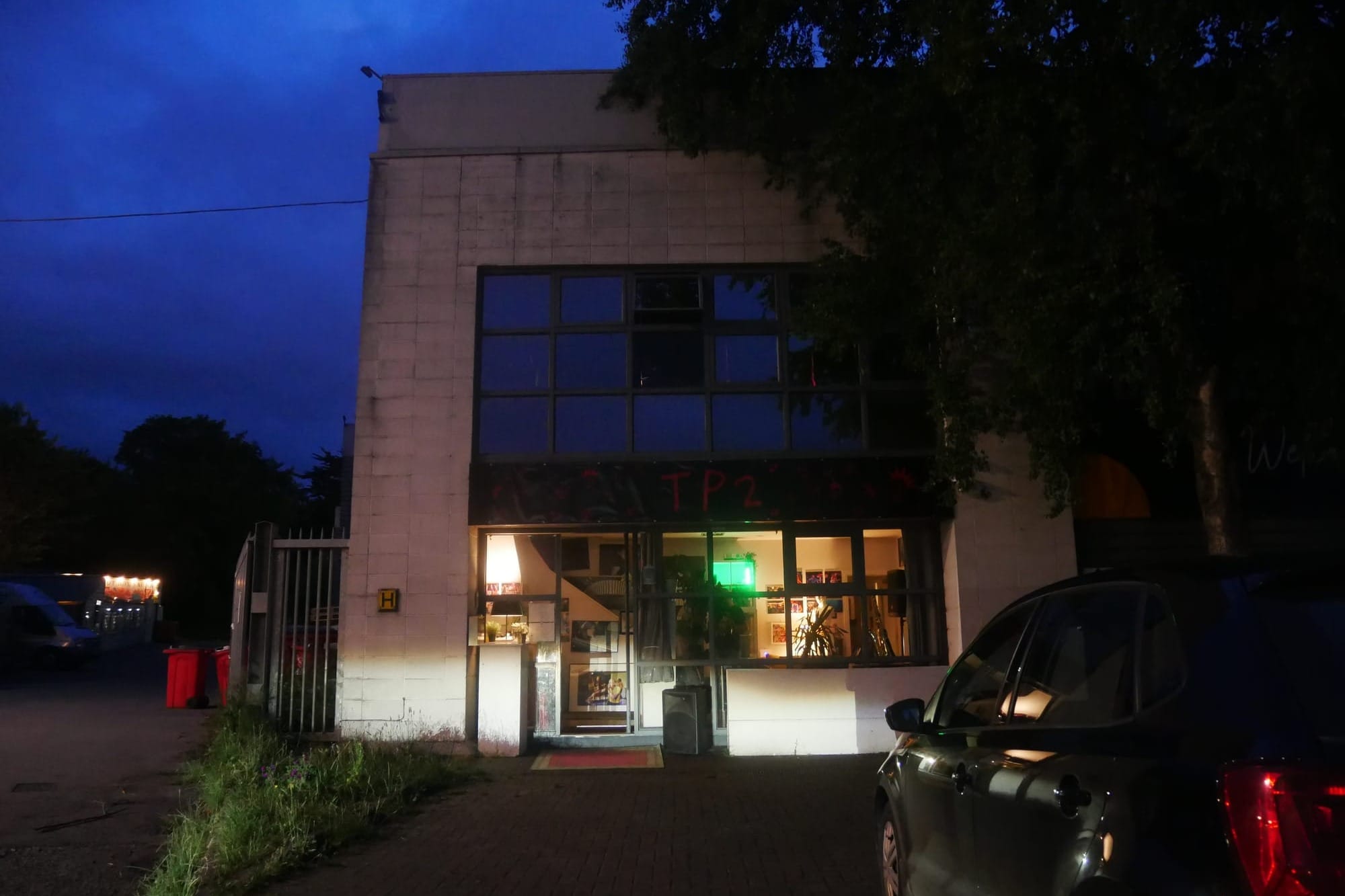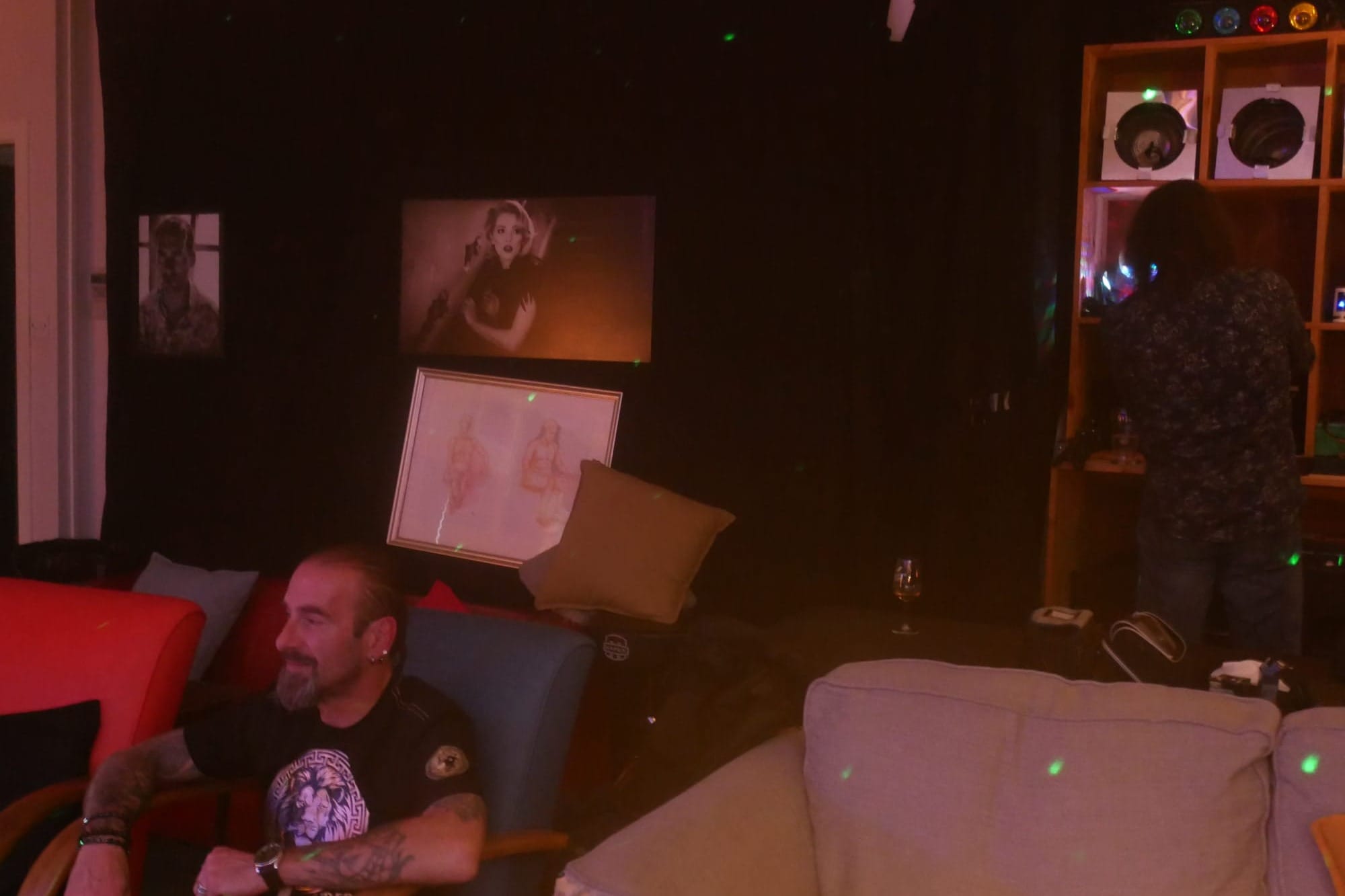In an Inchicore industrial estate, a members’ club invites people to mingle and jam
“The biggest thing that happens here and the most fantastic thing to see is people feel they own it,” says organiser Kamil Che.
“The biggest thing that happens here and the most fantastic thing to see is people feel they own it,” says organiser Kamil Che.

Through the entrance and up the corner stairs, the doorway opens onto a living room.
Maciek Piekarczyk relaxes into a big soft armchair. He drops his elbows on the wooden armrests. His trousers are patterned with green camouflage and his fingers are looped with big silver rings.
“I have a seat in the front row,” he says.
Piekarczyk feels too old for going out-out, so comes here to this unit in the Goldenbridge Industrial Estate on Friday evenings like this one, he says. “It’s me time.”
He isn’t there to play music really, he says. But to listen and to chill out and applaud those who do.
Half of the room is set up as if a stage. There’s a full drum kit, a keyboard, and electric and acoustic guitars. A handful of microphones are planted around. Spotlights turn from pink to purple. Green disco lights scatter and dance across the ceiling.
The other half of the room is set up to lounge, with a bookshelf and sofas and table lamps.
Pablo Pinto Nuñez, in a button-down shirt and v-neck sweater, bounces about the room. He picks up a tambourine from a low coffee table and gives it a rattle.
Grzegorz Witkowski plugs in his guitar and takes up lead-singer position.
Natalia Cichoń hangs back – for now. She perches on one side where soft cushions line a window ledge.
Cichoń is shy. Although less so than the first time she came to this open jam session, she says. “I was like, so I’m not like, this is not my space. I was like, I can’t, I won’t fit in.”
“Then I came and I was like, errrrrr, I’m going to stay,” she says.
There’s a smoke machine.
On centre stage, Witkowski noodles his way with confidence through a blues turnaround and into a jaunty summer riff.
The jam is free and easy, says Cichoń. “You just kind of go up. If you have any idea, you just go with it.”
“Because the atmosphere allows it. That’s the thing, so many people told me, there’s nothing that people do wrong,” she says.
“I want it to be one of those places where you have to actively do something to find out,” said Kamil Che, earlier that day.
Che – the main organiser behind the not-for-profit ThinkPunk and the TP2 space – is sat on a tall chair by a counter near the door to the unit.
He does want people to join, he says. But he doesn’t want to dilute that sense of wonder and discovery.
“We want people to know about it, but we … we are not commercial, if you know what I mean,” he says.
TP2 – similar to TP1, which used to run out of a warehouse in the John F. Kennedy Industrial Estate in Bluebell – is a members club.
It opened in Inchicore in February, says Che.
The space runs as a co-op really, he says. “With a lot of weight on myself on running this. But there is a lot of people that participate.”
Members helped to set it up, scavenge second-hand furniture, and they also help run events when they can, he says. “There’s always time that comes for certain people.”
“The biggest thing that happens here and the most fantastic thing to see is people feel they own it,” he says. “This is our space, this is what we do.”

Right now, TP2 has about 40 paying members, he says. A larger community of 200 people sometimes use the space, she says.
It’s mostly musicians, he says.
He gestures towards the shiny tenor saxophone that sits in the window. “Because naturally, they see instruments, music is happening,” he says.
But the space isn’t just for musicians, he says. “You can arrive here and we’re totally open. I mean, there are scenarios that I haven’t thought through, I know.”
At one end of the unit is a small room.
That’s a recording booth and podcast studio that they’re working on and plan to fundraise for later this year, says Che. “To acoustically treat it.”
The main ground-floor room has sofas and a small pool table, and big green plants – and vivid photos of musicians at play.
“I would love this to be alive, not only in the evenings,” says Che. “For people to come in, sit down, have a coffee, and just use it, you know.”
But members can’t buy anything here. “We don’t sell anything,” he says. “We won’t be selling anything. You come here, you can bring something to drink.”
That’s intentional. “There is enough commercial stuff,” he says. “There are lots of fantastic places, but they’re all commercial.”
They also want to be good neighbours, he says. There are plenty of places to buy stuff in the industrial estate, he says.
Rascals Brewing is just over the street next to the Stillgarden distillery and a hot-box sauna. The Gravity Climbing Gym is tucked behind, as is Kimex, the Afro-Caribbean and Asian cash and carry.
TP2 has two membership tiers. Full members pay €60 a month and for that they get regular access to the rehearsal space and the gear, and to come along to events of course.
Supporter members pay €15 a month, which gives them access to the jam sessions and they can come hang out, he says.
Well, the open jam sessions are free really anyway, says Che, but those who come often will ask how to contribute. “Because they like it and they want to support it.”
Grzegorz Witkowski was one of the first to arrive for last Friday’s open jam, later that evening.
He doesn’t know anywhere like TP2 in Dublin, he said, kicking back on a couch in the downstairs lounge. He was wearing shiny leather shoes and a black t-shirt from the rock-fusion band The Aristocrats.
But TP2 reminds him of a House of Culture, he says. Those hubs in the former Soviet Union and Eastern Bloc where people could go and hang out and sign up for cheap or free classes for music and art.
It was a positive of communism perhaps, says Witkowski. He laughs a little, almost to himself.
“In every city, every town, every village, you had at least one,” he says.
“It’s still this way,” says Natalia Cichoń.
She is younger than him, a student in linguistics at University College Dublin with deep red hair who, like Witkowski, also grew up in Poland. “That’s how I started singing as well,” she says.
On a couch on the other side of the pool table, Pablo Pinto Nuñez leans in to listen.
But it also reminds him of a time, Witkowski says. The heady days after the fall of the communist regime in Poland but before the present had taken a firmer form.
He started secondary school in 1989 – the year of the Round Table Talks and the end of the one-party state. “When we were on that edge,” says Witkowski.
When one day, he suddenly didn’t have to wear a uniform or sit so straight. “Suddenly, I’m 15 years old and I have long hair, and high boots, and telling the teacher to fuck off.”
“And you feel freedom,” he says. “It wasn’t about disrespect, it was about that freedom. Loads of people understood that, they were very hungry for that.”
From the edge of the jam session, Cichoń watches on for a while, then gets up. She crosses to another microphone and layers her voice on top, singing rich long notes.
For a few minutes, the guitarists and drummer play around above the same bass riff, stepping down over and again, weaving around each other, finding and leaving space.
A strong drum beat picks up.

Witkowski begins to growl into the microphone. It evolves into a heavy metal version of “Happy Birthday”.
The jam sessions take in all genres, says Mark McManus, a bass player.
He discovered ThinkPunk when it was still in Bluebell, he says. A Polish friend brought him after years of knowing each other and learning that he too played music, he says.
“Eventually, he was like, oh maybe you’d like this place. I was like, what? You’re keeping this shit from me,” says McManus.
Anyway, each night is different, he says. “It could be swing, it could be jazz, it could be rock, it could be doom metal. You don’t know what it’s going to be.”
Indeed, nobody dictates the genres, said Che earlier.
Part of what motivates him about ThinkPunk is giving up some ego, he says. “It can’t be done the way you want. Because if you do it exactly the way that you want, people will turn away.”
Of course, he still has preferences, he says. He doesn’t like covers, preferring improvisation.
“When you’re playing there and people from very different backgrounds, different continents, start playing together and you can tell, there are those magical moments when everything falls into place,” he says.
Those moments when everyone is tuned in to each other, he says. “Those moments are so magical.”
That’s the “zen” he searches for, he says. “And that I’m jealous of, musicians having this a lot.”
As the session rolls out, members drift in and out of the upstairs lounge. They wander outside onto the footpath for fresh air and breaks.
Pinto Nuñez puffs on a cigar. It’s about 10.30pm.
“Dude, you can play the drums, dude!” he says, as a fellow drummer comes out into the warm evening air. His grin is broad, delighted.
“No, you can play the drums!” says Kamlesh Thurmadoo, stepping back modestly. “I’m only learning. We’re always learning.”
The conversation relaxes into talk of who grew up where – Chile, Mauritius, Germany – and how great it is when a few drummers turn up to switch in and out with less sweat, more breaks.
Above them, the session continues. Chords and voices travel through an open window, and fade over concrete streets and squat buildings.